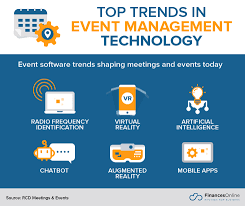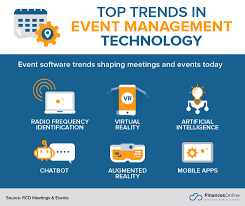Title: Unveiling the Top Event Management Platforms for Seamless Event Planning
Introduction:
In today’s fast-paced world, event management platforms have become indispensable tools for organizing successful events. These platforms offer a wide range of features and functionalities that streamline the planning process, enhance attendee engagement, and ensure seamless execution. In this article, we will explore some of the top event management platforms that have revolutionized the way events are planned and executed.
Eventbrite:
Eventbrite is a popular platform that caters to events of all sizes, from small workshops to large-scale conferences. It offers a user-friendly interface for event creation, ticketing, and registration management. Eventbrite also provides robust marketing tools to promote events through social media integration and email campaigns. With its mobile app, organizers can easily check-in attendees on-site and manage event logistics in real-time.
Cvent:
Cvent is an all-in-one event management platform designed for professional event planners. It offers comprehensive solutions for venue sourcing, registration management, budgeting, and reporting. Cvent’s advanced features include personalized event websites, mobile apps for attendees, onsite badge printing, and session tracking. The platform’s powerful analytics enable organizers to gain valuable insights into attendee behavior and measure event success.
Bizzabo:
Bizzabo is known for its innovative approach to event management with a focus on enhancing attendee engagement. This platform enables organizers to create branded event websites with interactive agendas and networking opportunities. Bizzabo’s integrations with popular CRM systems facilitate seamless data synchronization and lead generation during events. The platform also offers robust analytics to track attendee satisfaction levels and measure ROI.
Eventzilla:
Eventzilla caters to both small-scale and large-scale events with its user-friendly interface and affordable pricing options. This platform simplifies the registration process by allowing attendees to register quickly through customizable forms or social media logins. Eventzilla also provides event promotion tools, including email marketing and social media integration. With its mobile app, organizers can easily check-in attendees and manage event logistics on the go.
Whova:
Whova is a feature-rich event management platform that focuses on enhancing attendee networking and engagement. It offers a virtual event platform that enables organizers to host hybrid or fully virtual events seamlessly. Whova’s interactive agenda builder, live polling, and Q&A features encourage attendee participation and interaction. The platform also includes AI-powered matchmaking to facilitate meaningful connections among attendees.
Conclusion:
Event management platforms have revolutionized the way events are planned and executed by simplifying processes, enhancing attendee engagement, and providing valuable insights for organizers. The platforms mentioned above are just a few examples of the top solutions available in the market today. When selecting an event management platform, consider your specific needs, budget, scalability requirements, and desired features to find the perfect fit for your event planning endeavors.
Frequently Asked Questions About Top Event Management Platforms
- What is online event management?
- What are some of the planning tools used in special events management?
- What is event planning tools?
- What does platform mean in event management?
What is online event management?
Online event management refers to the process of planning, organizing, and executing events virtually or partially online. It involves using various digital tools and platforms to facilitate event registration, ticketing, attendee engagement, content delivery, networking, and other aspects typically associated with in-person events.
With online event management, organizers can host a wide range of events such as conferences, webinars, virtual trade shows, workshops, and networking sessions. These events can be fully virtual or hybrid (combining both virtual and in-person elements).
Key components of online event management include:
- Event Registration: Online event management platforms allow attendees to register for events conveniently through customized registration forms or integrated ticketing systems.
- Virtual Event Platforms: These platforms provide a virtual space for hosting the event. They often offer features such as live streaming of sessions, interactive chat rooms for networking and Q&A sessions, virtual exhibitor booths, and on-demand content access.
- Content Delivery: Online events rely on digital content delivery methods such as live streaming presentations or pre-recorded sessions that can be accessed by attendees at their convenience.
- Attendee Engagement: Online event management aims to replicate the engagement opportunities found in traditional events through features like real-time Q&A sessions, chat functionalities for networking with other attendees or speakers, gamification elements to encourage participation, and interactive polls.
- Analytics and Reporting: Digital tools provide organizers with valuable insights into attendee behavior and engagement metrics during the event. This data helps assess the success of the event and provides feedback for future improvements.
- Technical Support: Online event management requires technical support to ensure smooth operation during the event. Support teams assist with troubleshooting issues faced by organizers or attendees related to connectivity or platform usage.
Online event management has gained significant popularity due to its flexibility, cost-effectiveness compared to physical events, global reach potential without geographical constraints, reduced carbon footprint associated with travel logistics for in-person events, and increased accessibility for participants with mobility or other limitations.
Whether hosting a fully virtual event or incorporating online elements into hybrid events, online event management offers a dynamic and scalable solution to engage audiences and deliver impactful experiences in the digital realm.
What are some of the planning tools used in special events management?
Planning tools play a crucial role in the successful management of special events. They help organizers streamline tasks, stay organized, and ensure smooth execution. Here are some commonly used planning tools in special events management:
- Event Management Software: Comprehensive event management software platforms like Eventbrite, Cvent, Bizzabo, and Whova offer a wide range of planning tools. These include features such as event registration and ticketing, attendee management, agenda scheduling, venue sourcing, budgeting and financial tracking, marketing and promotion tools, analytics and reporting capabilities.
- Project Management Tools: Project management tools like Trello, Asana, or Monday.com help teams collaborate effectively by creating task lists, assigning responsibilities to team members, setting deadlines, and tracking progress. These tools provide visibility into project timelines and allow for seamless communication among team members.
- Event Planning Checklist: An event planning checklist serves as a roadmap for organizers to ensure that all necessary tasks are completed leading up to the event. It includes items such as venue selection and booking, vendor coordination (caterers, audiovisual providers), marketing and promotion strategies, logistics planning (transportation arrangements), attendee registration setup, budget allocation and tracking.
- Budgeting Tools: Managing finances is crucial in event planning. Budgeting tools like Excel spreadsheets or specialized software such as Google Sheets or QuickBooks can help organizers create budgets that track expenses across different categories (venue costs, equipment rentals). These tools allow for real-time monitoring of expenses against allocated budgets.
- Communication Tools: Effective communication is essential for successful event management. Tools like Slack or Microsoft Teams facilitate seamless communication among team members by providing channels for discussions on specific topics or departments. Email platforms like Gmail or Outlook are also commonly used for official correspondence with vendors or stakeholders.
- Event Diagramming Software: Event diagramming software such as Social Tables or AllSeated allows organizers to create detailed floor plans for venues. These tools help visualize seating arrangements, booth layouts, and exhibit placements. They also assist in managing guest lists and table assignments.
- Survey and Feedback Tools: Collecting feedback from attendees is crucial for assessing event success and identifying areas for improvement. Tools like SurveyMonkey or Google Forms enable organizers to create online surveys to gather feedback on various aspects of the event, including attendee satisfaction, session evaluations, or overall experience.
Remember that the selection of planning tools depends on the specific needs of your event, budget constraints, and the size of your organizing team. It’s important to choose tools that align with your requirements and enhance efficiency throughout the planning process.
What is event planning tools?
Event planning tools are software platforms or applications designed to assist event organizers in managing various aspects of event planning and execution. These tools provide a range of features and functionalities that streamline the entire event management process, from initial planning stages to post-event analysis. Event planning tools can be used for a wide variety of events, including conferences, trade shows, weddings, fundraisers, and more.
Some common features found in event planning tools include:
- Event Registration and Ticketing: Tools that allow organizers to create customized registration forms, manage ticket sales, and track attendee information.
- Venue Management: Tools that assist with venue selection, floor plan design, seating arrangements, and logistics management.
- Agenda and Schedule Management: Tools that help create event agendas or schedules with session details, speaker information, and time slots.
- Communication and Marketing: Tools that enable organizers to send out email invitations, promote events on social media platforms, and manage attendee communication.
- Attendee Engagement: Tools that enhance attendee engagement through features like live polling, Q&A sessions, networking opportunities, and interactive mobile apps.
- Budgeting and Financial Management: Tools that assist with budget creation and tracking expenses related to the event.
- Onsite Operations: Tools that facilitate smooth onsite operations such as attendee check-in systems, badge printing solutions, lead retrieval devices for exhibitors, etc.
- Analytics and Reporting: Tools that provide data analytics on various aspects of the event like attendance rates, ticket sales trends, attendee satisfaction levels, etc., helping organizers measure the success of their events.
Event planning tools offer convenience by centralizing all essential tasks in one platform while saving time and reducing manual effort. They provide organizers with greater control over their events while ensuring a seamless experience for attendees. The choice of event planning tool depends on the specific needs of the event organizer or company organizing the event – factors such as budget constraints, size of the event, and desired functionalities play a crucial role in selecting the most suitable tool.
What does platform mean in event management?
In the context of event management, a platform refers to a software or technology solution that provides a centralized system for planning, organizing, and managing events. It serves as a digital hub where event organizers can handle various aspects of event management, such as registration, ticketing, marketing, attendee engagement, logistics, and reporting.
Event management platforms offer a range of features and tools that simplify the planning process and streamline operations. These may include event website creation, online registration forms, ticketing systems, email marketing capabilities, attendee database management, agenda scheduling, networking tools, mobile apps for attendees and organizers, analytics and reporting functionalities.
By utilizing an event management platform, organizers can automate many tasks that were previously time-consuming and prone to errors. These platforms enable seamless communication between organizers and attendees while providing real-time updates on registrations, ticket sales, and other important metrics. Additionally, they often offer data insights that help organizers measure the success of their events and make informed decisions for future planning.
Overall, event management platforms enhance efficiency and effectiveness in organizing events by centralizing essential tools and functionalities in one place. They empower organizers to create memorable experiences for attendees while streamlining operations behind the scenes.


